Top-Rated English Vocabulary Apps for Learners Who Want to Speak Confidently
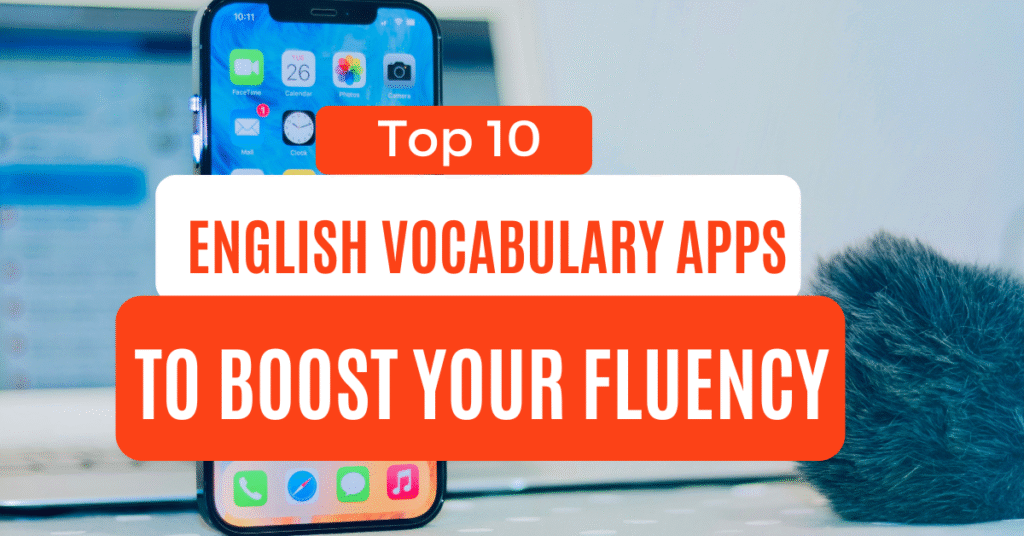
Introduction
Let me ask you something. Do you sometimes feel stuck when speaking English because you find yourself struggling for the right word? Or maybe you understand English but can’t express your ideas clearly? Don’t worry—you are not alone. Many non-native learners face the same problem. The good news is: building your English vocabulary through English vocabulary apps can help you gain confidence to express yourself clearly!
And guess what? You don’t need to mug up the dictionary. Thanks to technology, you can use English vocabulary apps on your phone anytime, anywhere. These apps are like portable resources in your pocket. They make learning new words fun, fast, and easy.
In this post, I’ll share the top 10 English vocabulary apps that will help you improve your vocabulary, step by step. I’ll also give you simple strategies and tricks to use them effectively. Consider me your friendly guide, showing you the best tools and ways to build fluency—even if you’re just a beginner.
So, let’s get started!
Why Use English Vocabulary Apps?
Before we dive into the list, let’s understand in which way these apps deliver value:
- Convenience – You can learn new words anytime and anywhere.
- Fun – Most apps use games, flashcards, and quizzes. Learning becomes super fun for everyone.
- Daily Practice – These apps remind you to practice regularly. A little bit every day can get you on track.
- Beginner-friendly – Even if you don’t know much English, the apps guide you step by step.
Simply put: English vocabulary apps make learning easier for everyone, anytime, anywhere.
How to Choose the Right English Vocabulary App
Not all apps are the same. Here are a few tips to choose wisely:
- Pick an app with a simple interface (easy to use).
- Check if it has audio pronunciation to improve speaking.
- Look for example sentences (so you learn words in proper context).
- Choose apps with review features (so you don’t forget words).
Now that you know what to look for, let’s explore the top 10 apps that I recommend.
Top 10 English Vocabulary Apps
1. Duolingo
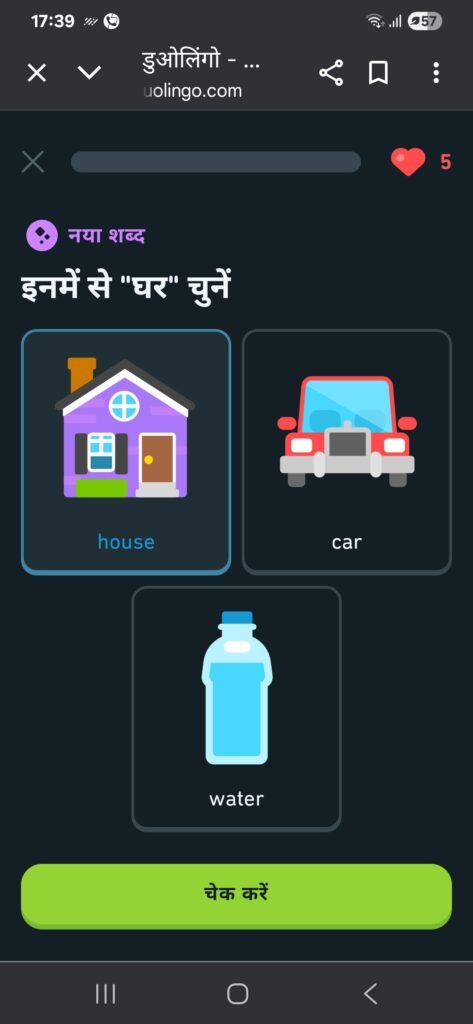
This is one of the most famous apps for learning languages. It is highly engaging—you earn points, unlock levels, and compete with friends.
- Best features: Fun quizzes, short lessons, daily streaks.
- Why it’s useful: It teaches vocabulary with sentences, so you learn context, not just single words.
- Example use: Learn 10 minutes daily while having your morning tea.
Perfect for beginners who want to make learning fun.
2. Memrise
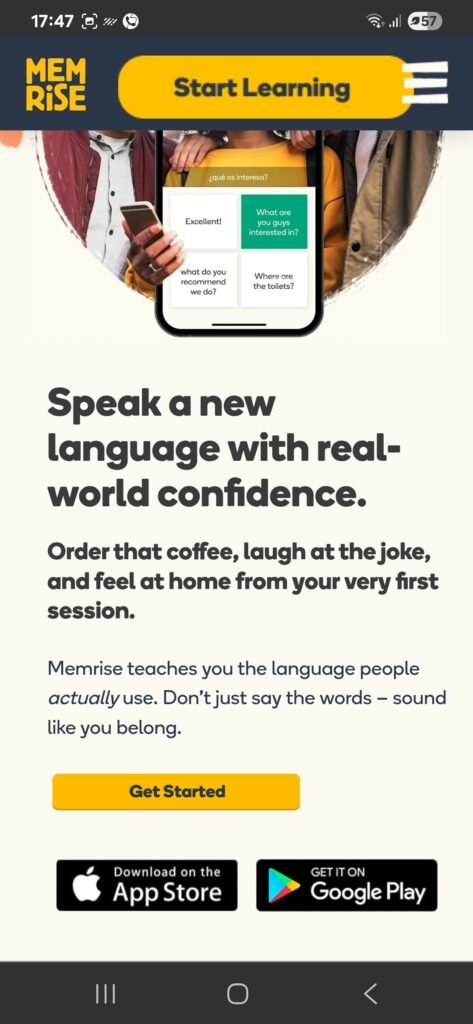
Memrise is built on “memory techniques.” It uses a spaced repetition system to boost long term retention. It helps you remember words with images, stories, and example sentences.
- Best features: Native speaker videos, spaced repetition (reviewing words at the right time).
- Why it’s useful: You don’t just memorize—you actually remember.
- Example use: Save 5 new words today and test yourself tomorrow.
Great for learners who often forget new words.
3. Quizlet
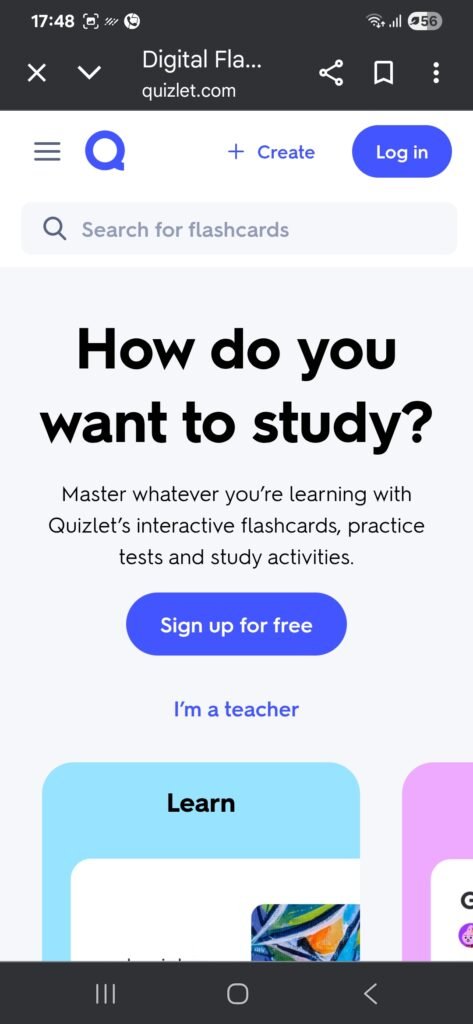
Quizlet is like your digital flashcard library. You can create your own cards or use sets made by other learners. It has millions of user-created study sets.
- Best features: Flashcards, matching games, practice tests.
- Why it’s useful: You can create a personal vocabulary set (e.g., “Travel Words” or “Workplace English”).
- Example use: Make 10 flashcards of new words from today’s newspaper.
Ideal for students preparing for exams like IELTS or TOEFL.
4. Hello English

This app is very popular in India and other countries. It focuses on daily conversations and practical vocabulary. It engages learners through daily homework, news articles, tips, and real-world vocabulary.
- Best features: Grammar lessons, word games, practice with friends.
- Why it’s useful: It explains words in simple English and sometimes your local language too.
- Example use: Practice vocabulary while chatting with the in-app bot.
Perfect for beginners who want to start speaking quickly.
5. Vocabulary.com
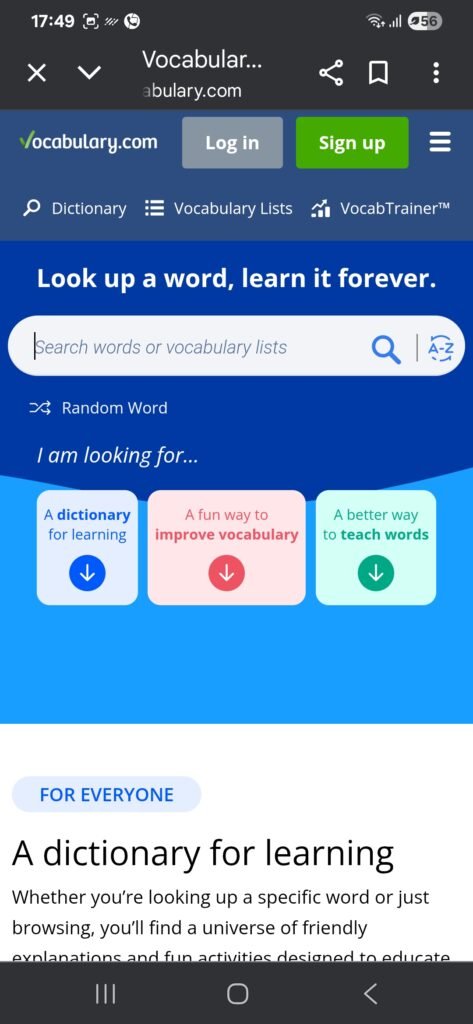
As the name suggests, this app is all about vocabulary. It gives you clear meanings and example sentences. It employs intelligent algorithms that adapt quizzes and word selections based on your learning progress. Also, learning is gamified with points, badges and challenges.
- Best features: Word challenges, real-life usage examples.
- Why it’s useful: The app adjusts according to your level. It teaches what you need.
- Example use: Learn 3 new words while commuting to work.
Excellent for learners who like clear explanations.
6. Busuu
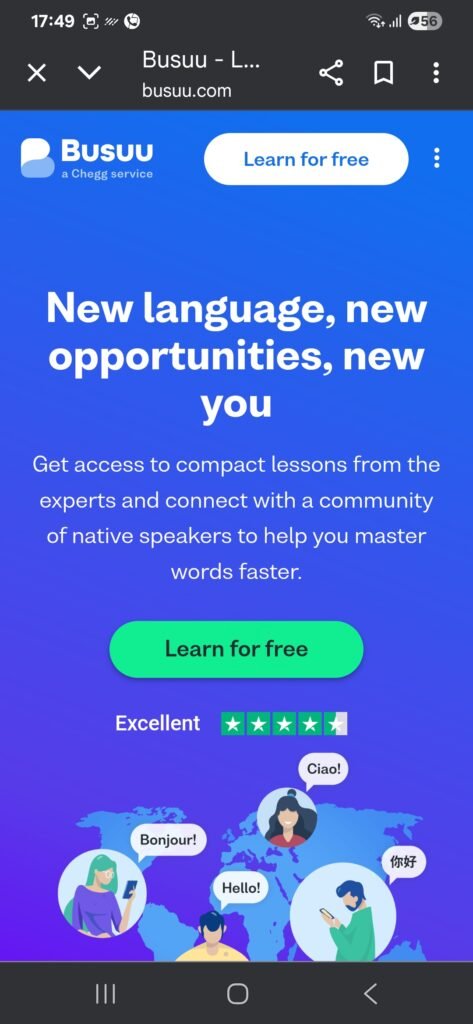
Busuu is a complete language-learning app, but its vocabulary section is very strong. Its AI-driven tools help create tailored study schedules based on your goals. Also, it offers real-time pronunciation feedback via speech recognition.
- Best features: Short lessons, community support (native speakers correct your practice).
- Why it’s useful: You learn vocabulary in dialogues, so it feels real.
- Example use: Complete one short vocabulary lesson daily.
Good for learners who want both vocabulary and speaking practice.
7. BBC Learning English
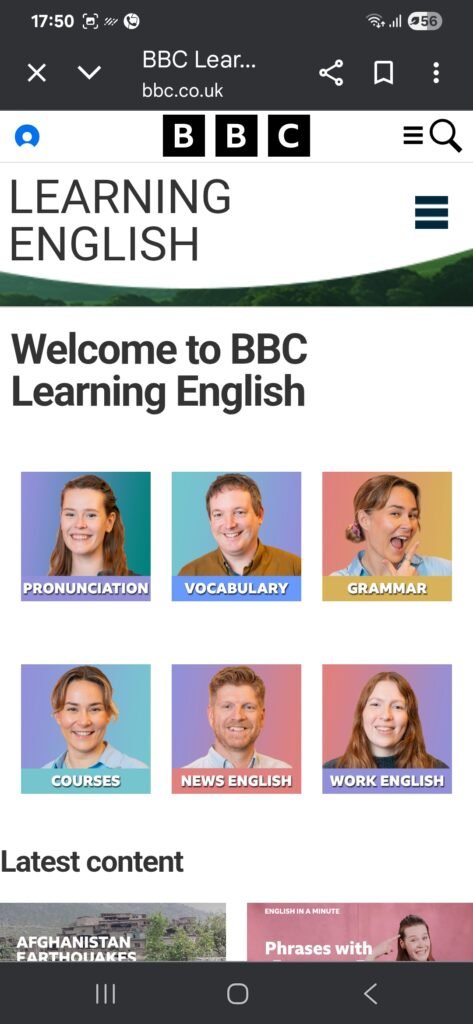
This is more than an app—it’s like an English learning treasure. It has videos, podcasts, and articles. It delivers high-quality content through news stories, current events and culturally rich content. This app is great for targeting specific interests or needs.
- Best features: “The English We Speak” section (full of idioms and new words).
- Why it’s useful: You learn vocabulary the way people actually use it.
- Example use: Listen to one podcast daily while walking.
Best for learners who enjoy real-world English.
8. Anki
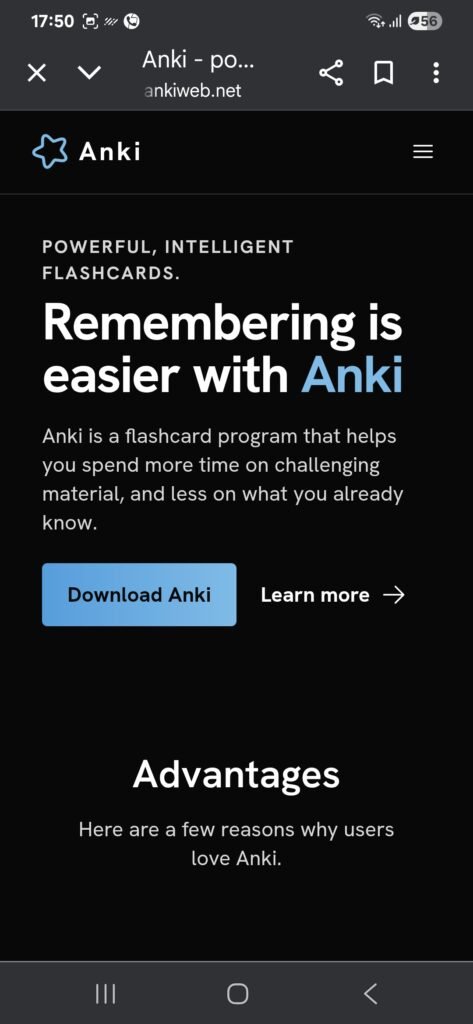
Anki is a flashcard app but very powerful. It uses “spaced repetition,” which means it helps you efficiently retain vocabulary and factual information over the long term.
- Best features: Customizable flashcards, spaced repetition system.
- Why it’s useful: It’s one of the best tools for long-term memory.
- Example use: Review yesterday’s 10 words today for 5 minutes.
Perfect for serious learners who want to build a large vocabulary.
9. LingQ

LingQ teaches vocabulary through reading and listening. You learn words inside real articles, stories, and podcasts. You can click on unfamiliar words to mark them as LingQs, which are then highlighted and added to your flashcard review lists. Over time, these highlights fade as words become familiar, visually tracking your progress.
- Best features: Thousands of real texts, audio with transcripts.
- Why it’s useful: You see words in context, not in isolation.
- Example use: Read a short article daily and highlight new words.
Great for learners who love reading and listening.
10. WordUp Vocabulary
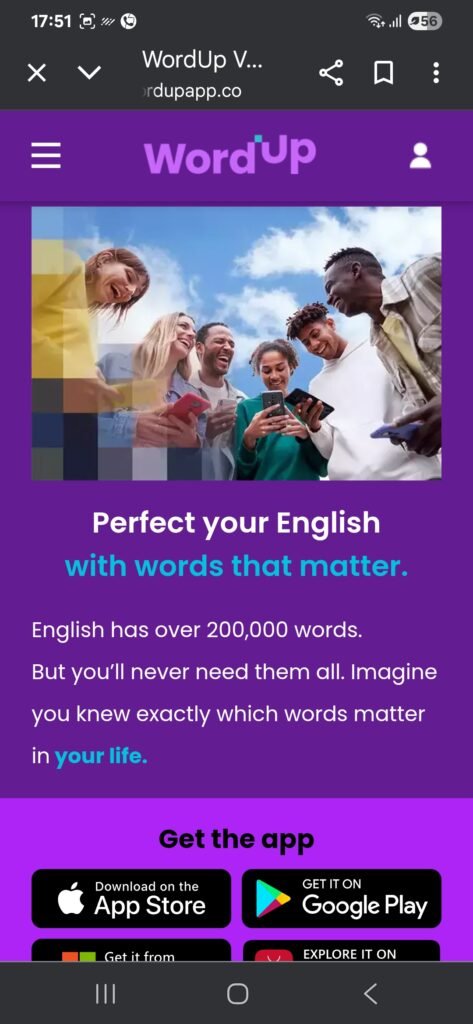
This app focuses on teaching words based on how often they are used in real life. This app includes idioms and phrasal verbs, complete with visual aids. Many words feature audio pronunciation and pro tips.
- Best features: Movie clips, daily goals, word frequency ranking.
- Why it’s useful: You focus on the most useful words first.
- Example use: Watch a movie clip, learn the word, and repeat it aloud.
Best for learners who want practical vocabulary for conversations.
Strategies to Use These English vocabulary Apps Effectively
Now that you know the apps, let me share some strategies so you don’t just download them and forget:
- Set a daily goal – Even 10 minutes a day is enough.
- Focus on 5 new words daily – Quality matters more than quantity.
- Review regularly – Don’t just learn new words, revise old ones too.
- Use new words in real life – Text your friend: “I’m over the moon today!”
- Speak aloud – Don’t just read silently. Pronounce every word.
Tricks to Remember New Words Faster
Learning words is one thing, remembering them is another. Here are my favorite tricks:
- Create associations: For “bark” (dog sound), imagine a tree “bark.” Two images, one word. Easy to remember.
- Use flashcards: Apps like Quizlet or Anki are perfect.
- Make sentences: Instead of just “happy,” say: “I was over the moon when I passed my exam.”
- Teach someone: Share the word with a friend. It strengthens learning. learning.
- Record yourself: Say the word, sentence, and meaning in your own voice. This helps retain the word for a long time.
Common Mistakes to Avoid
Be careful! Many learners waste time because they:
- Memorize words but never use them in conversations.
- Learn 50 words in one day but forget them next week.
- Ignore pronunciation while learning vocabulary (leading to confusion later).
- Depend only on English vocabulary apps but never practice speaking otherwise.
Remember: Apps are tools, not magic. You must practice in real life.
Daily 10-Minute Routine
Here’s a mini routine you can follow with any of these English vocabulary apps:
- Learn 5 new words from the app.
- Listen to their pronunciation 2–3 times.
- Write one sentence for each.
- Speak the sentences aloud.
- Use at least one word in real conversation (chat or call).
Do this daily, and in 1 month you’ll know 150 new words!
Motivation for Beginners
Let me tell you something important: Don’t feel shy if your English is not perfect right now. Consider it similar to building a house. Every new word is a brick. Slowly, brick by brick, your house (your English) becomes stronger.
- Even 1 word a day = 365 words in a year!
- Mistakes are not failures; they are catalysts for getting success.
- Keep learning fun with games, stories, and apps.
- Stay consistent. Small daily steps create big success.
So don’t wait for “someday.” Start today.
Conclusion
We’ve explored the top 10 English vocabulary apps: Duolingo, Memrise, Quizlet, Hello English, Vocabulary.com, Busuu, BBC Learning English, Anki, LingQ, and WordUp Vocabulary. Each app has its own strength, and together they cover every learning style.
However, remember: downloading the app is not enough. Use it daily, speak aloud, make sentences, and practice in real life. That’s the real secret to building fluency.
Here’s my friendly advice: Pick just ONE app from this list today and start using it for 10 minutes. Trust me, you’ll thank yourself later. The more words you learn, the more confident you’ll feel, and soon speaking English will be a piece of cake.
Now it’s your turn—download one of these apps today, and let’s build your English vocabulary step by step. I’ll always be here as your guide whenever you need me.
Share your thoughts:
Share in the comments, which app are you going to try first? Also, feel free to ask questions, if you have any. Don’t forget to subscribe for more such useful content.
I create content to make English learning simple and practical. If you find it helpful, consider supporting me. Your contribution helps me improve my skills and bring better content for you.
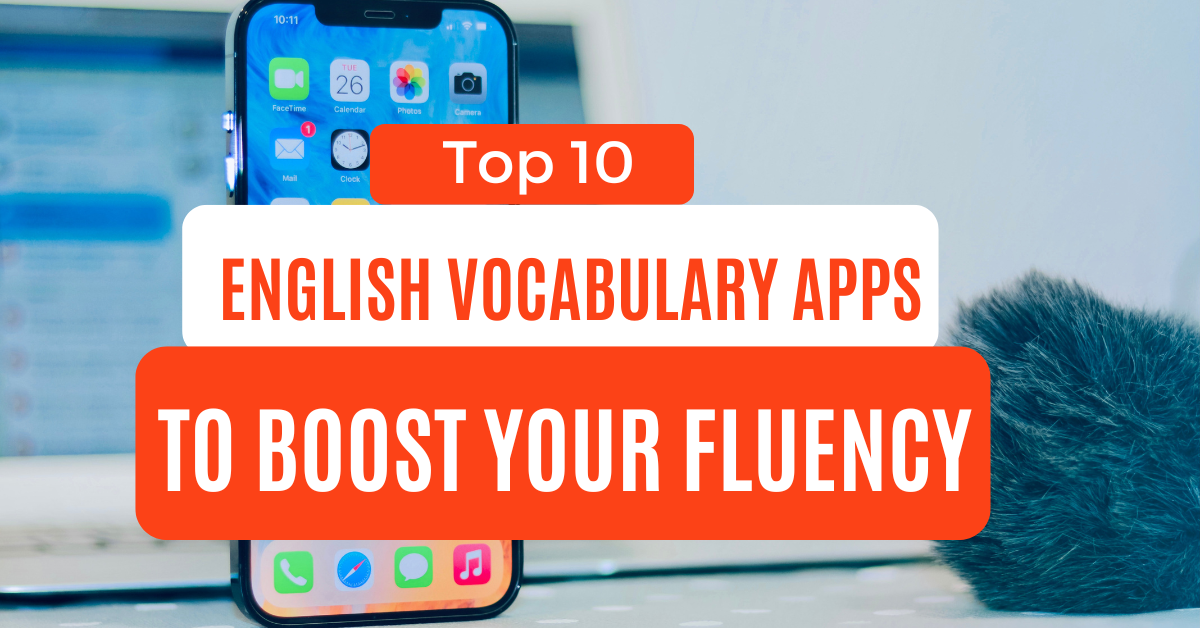



Solid analysis! Good luck everyone!
Thank you! Good luck to you, too.
Interesting read!
Thank you!
Interesting analysis!
Thank you!
I like what you guys are up too. Such smart work and reporting! Keep up the excellent works guys I have incorporated you guys to my blogroll. I think it will improve the value of my site :).
Thanks for the kind gesture! I appreciate it.
Hi, i feel that i saw you visited my weblog so i came to “return the choose”.I’m trying to find things to improve my web site!I suppose its adequate to make use of a few of your concepts!!